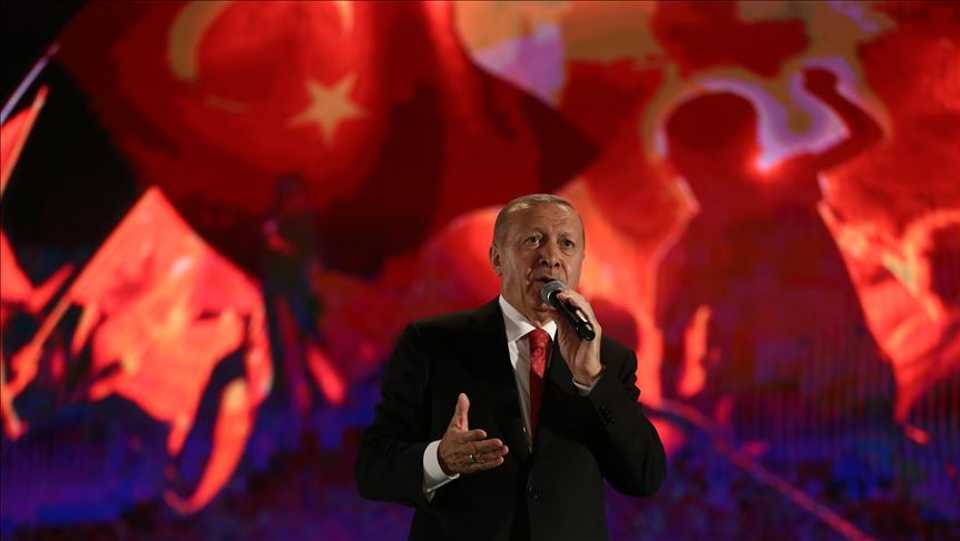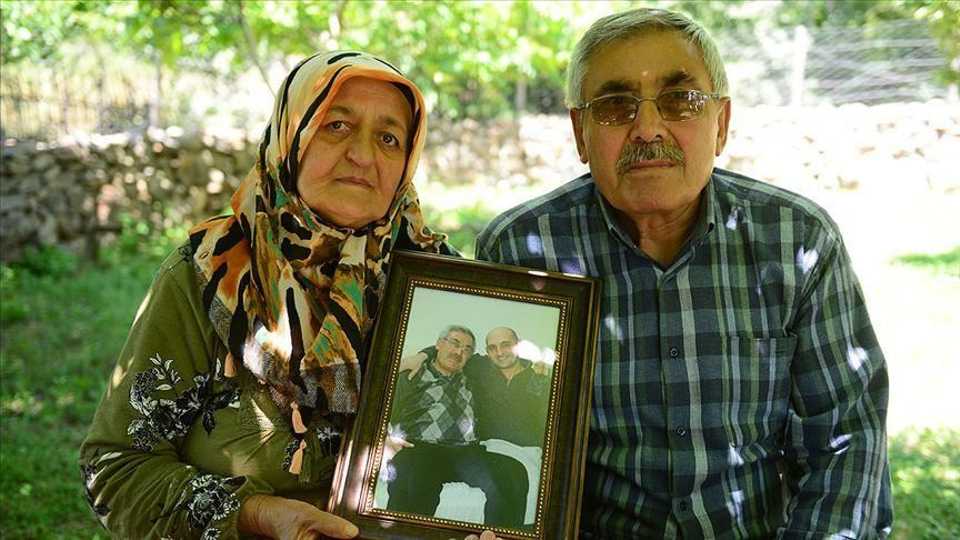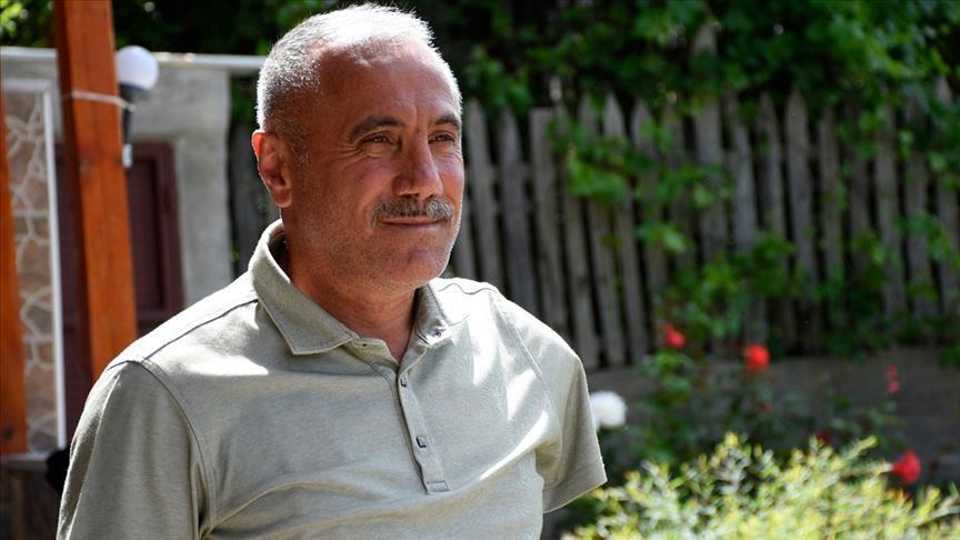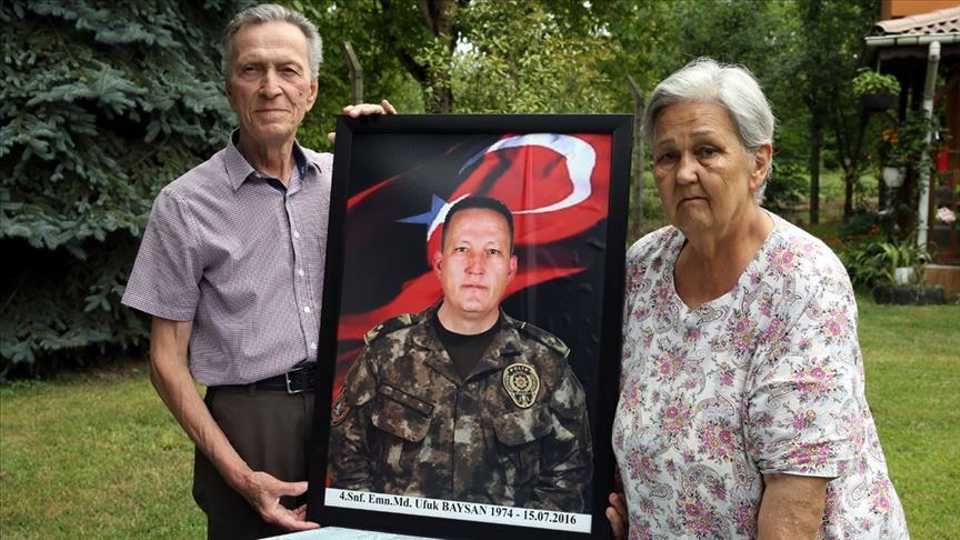
Turkey marks the third anniversary of a defeated coup, which left 251 people dead and nearly 2,200 injured.
On July 15, 2016 a rogue faction in the Turkish military launched a coordinated operation to overturn the government.
In several major cities, including the capital Ankara and the country’s biggest city Istanbul, they attempted to seize key installations.
As news of the coup attempt, by the Fetullah Terrorist Organisation (FETO), spread, citizens left their homes and offices to stop the soldiers armed with guns and tanks.
Three years later, families are still grieving their lost loved ones.
Commemorations
Turkey’s President Recep Tayyip Erdogan on Monday addressed the public at Istanbul’s old Ataturk Airport.
In his speech Erdogan said Turkey would never be occupied by those who sold their souls to the devil.
“On the night of July 15, they wanted to bury Turkey into darkness but failed, Allah ruined their traps,” he said.
“I salute every member of our heroic nation, who stood against planes, tanks, bullets to protect the independence of our nation and the future of our country on July 15,” he added.
In his speech, Erdogan applauded the soldiers and staff of the Turkish Armed Forces.
“I would like to express my gratitude on behalf of myself and my nation to our media, non-governmental organisations and intellectuals for setting an example to the world,” Erdogan said.
Here are the some key takeaways from his speech.
Earlier, he attended a prayer recitation at a mosque on the grounds of the presidential complex in Ankara.
Right after the event , Erdogan also attended the inauguration ceremony of the police headquarters building in the capital Ankara, previously destroyed during the coup attempt.
“As long as Turkey has its soldiers, police and intelligence, no one will attempt again to occupy the country,” Erdogan said, adding that police had fought shoulder to shoulder with civilians against the coup plotters.
Turkish ministers on Monday also commemorated the third anniversary.
“On the anniversary of July 15, we commemorate our heroic martyrs, who gave their lives for democracy and homeland with mercy and our veterans with gratitude,” Mevlut Cavusoglu, Turkish foreign minister, said in a Twitter post.
“On the night of July 15, we showed the world that we would not kneel before any human power other than the will of the nation. This honour is granted to very few nations,” Abdulhamit Gul, the justice minister said, also on Twitter.
“We commemorate all the martyrs who sacrificed their lives for our independence and future with mercy and gratitude,” Gul added.
Culture and Tourism Minister Mehmet Ersoy said July 15 is also an absolute warning to those who want to test our will.
“We will not forget the betrayal to our nation that night and nation’s heroism,” said Treasury and Finance Minister Berat Albayrak in a Twitter post.
Transport and Infrastructure Minister Cahit Turhan, attending a ceremony hosted by Turkish satellite operator Turksat, said coup plotters had tried to occupy the Turksat campus to disrupt the broadcast. “Their (Turksat staff) heroism will not be forgotten,” Turhan said.
“As a last resort, they tried to stop the broadcast by bombing the campus. The AKA-1 was shot and a jet bombed the campus by making four dives on Turksat. The treacherous coup plotters could not achieve their abusive goals, and at 2:40 am they ran away, without looking back,” Turhan said.
“Our solidarity with the Turkish people is not into question at all,” the EU’s High Representative of the Union for Foreign Affairs and Security Policy, Federica Mogherini said in Brussels.
TRT World speaks to Senior Advisor to Turkish President Gulnur Aybet who describes the night’s “tense” atmosphere.
Grief and pride
Ahmet Hasbal’s sons Cengiz and Huseyin, were at the forefront of a group of democracy supporters headed to Istanbul’s famed Bosphorus Bridge – since renamed the July 15 Martyrs’ Bridge – which had been barricaded by putschist forces.
“When they arrived at the bridge, [the putschists] opened fire on them,” Hasbal said.
“Cengiz was shot by the second volley of bullets. The bullets went past Huseyin, but Cengiz collapsed. We went [to Istanbul] the next day, but Cengiz died 19 days later.”
Hasbal said the pain over the loss of his son never leaves him.
“There is not a single day over the last three years that we have forgotten him. The people who were martyred for their country and nation are unforgettable,” he said.
Durdane Hasbal, the boys’ mother, said she hopes her son is at peace in heaven, adding: “I’m not the only mother of a martyr, but I am proud to be one.”

‘We’re all brothers!’
Uzeyir Civan, one of the thousands of Turkish citizens who poured onto the streets the night of July 15, 2016, said he was proud to defend his country even at the loss of an arm.
Civan, currently living in Gumushane in Turkey’s Black Sea region, was in Tuzla, Istanbul that night when he was shot by rogue soldiers.
Turkish citizens who thronged the streets would not stand idle in the face of traitorous FETO soldiers even at the risk of losing their lives or limbs, Civan said.
“I thought I could convince them to return to the barracks by telling them what they were doing was wrong,” Civan said.
“’Stop! Drop your weapons, we’re all brothers!’ I shouted,” he said.
“I ran towards them even before the people next to me were shouting ‘Soldiers are brothers of the police,’ but they started shooting at me, aiming at me.”
Civan remembered his hand getting injured, and how later, in the hospital, that injury cost him his arm.
“Thank God I lost my arm, not my country. We didn’t deliver our homeland to traitors,” Civan said.
“I’m alive, but I could also die for my country.”

Hardest day
Ufuk Baysan was a chief of police in the Special Forces Command in Golbasi, a district in Ankara, Turkey’s capital.
“July 15 is a painful memory for myself and families with martyrs like us,” Ramazan Baysan, Ufuk’s father, said. Ufuk was killed that night.
Baysan said he considers the putschists’ actions that night to be inhumane, adding that he cannot accept what they did to their fellow citizens.
“It is unacceptable to bomb ordinary people, no matter if they were elderly, or young people, or children, or the Turkish parliament,” Baysan said.
On the loss of his son, Baysan added: “No matter how much the pain is suppressed, it doesn’t disappear. Every day and hour, my son is before my eyes, but we have to accept the situation.”
Baysan said he felt blessed that his son was martyred while protecting the country, explaining: “Any other way would hurt me.”
Hanife Baysan, Ufuk’s mother, called July 15 the hardest day for her.
“I’m proud that he was martyred, but my heart also aches,” she said.

International support
Officials and international organisations across the globe had condemned the defeated coup attempt, addressing their support to the Turkish government and people.
The first country to express its support was Bosnia and Herzegovina.
Russian President Vladimir Putin was the first foreign leader to call Turkey’s President Erdogan after the attempt.
Former Georgian president Giorgi Kvirikashvili and former Kazakh president Nursultan Nazarbayev were the first high-level visitors to Turkey after the coup attempt.
High-level officials from Bahrain, Palestine, Qatar, Iraq and Iran also personally travelled to the country.
The Council of Europe, the European Parliament, the Parliamentary Assembly of the Council of Europe, the Parliamentary Assembly of the Organisation for Security and Co-operation in Europe (OSCEPA), the UN and the Union of NGOs (non-governmental organisations) of the Islamic World, visited Ankara after the coup attempt.
The US threw its weight behind Turkey three hours after it was announced that an attempt to overthrow the government had been launched, with former US vice president Joe Biden visiting Turkey more than a month later.
The president and prime minister of the Turkish Republic of Northern Cyprus – Mustafa Akinci and Huseyin Ozgurgun, respectively – Macedonian President Gjorge Ivanov, Iraqi Parliament Speaker Salim al Jabouri, Bulgarian Prime Minister Boyko Borisov, former Iraqi Kurdish Regional Government President Masoud Barzani, Pakistani Punjab State Chief Minister Shahbaz Sharif, also made visits to Turkey after the coup attempt.










Discussion about this post